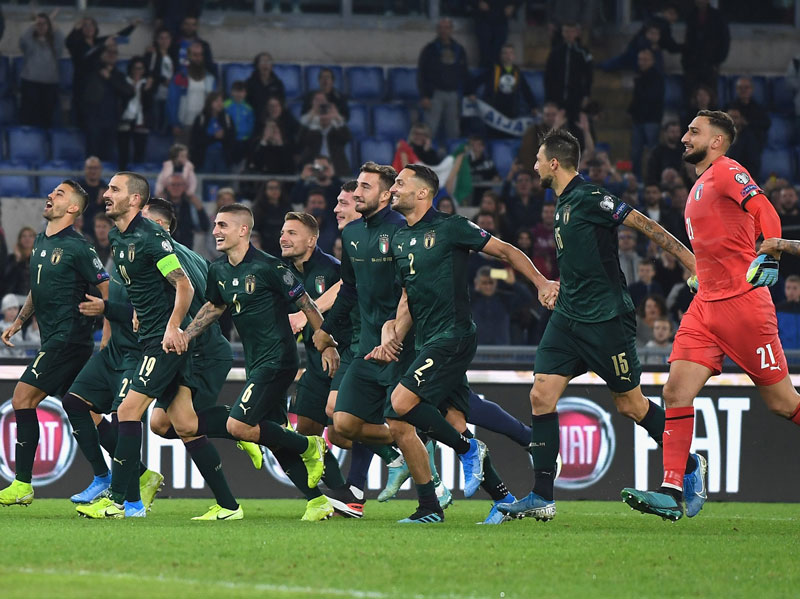Paddy Agnew’s Notes From Italy: Italy Qualify For Euro 2020 In Record Time
You have to hand it to Roberto Mancini, the Italian national team coach. Last Saturday night at the Olimpico in Rome he pulled off a remarkable feat in qualifying Italy well ahead of time for next summer’s EURO 2020 championships, thanks to a 2-0 win over Greece.
Obviously, one could argue that for Italy to win a group which also contained Finland, Bosnia, Greece, Armenia and Lichtenstein is not any great shakes. That is what you might expect from the four times World Champions.
However, what needs must be remembered is that Mancini was starting off in this qualifying round from the back of the grid. Just 23 months after the most humiliating international night in recent Italian history, with that World Cup elimination in a 0-0 draw with Sweden, Italy is back at the Top Table of world football.
What makes Mancini’s achievement all the more splendid is that he himself has been in the Italian hot seat just 17 months. In less than a year and a half, he has forged a side capable of winning seven successive qualifiers, thus winning the group with three games to spare. Needless to say, that represents a record fast Finals qualification for Italy.
The opposition is what it is but you cannot do better than beat them all, beating them too with an at times “sprizzante” (sparkling) football. That is, of course, until last Saturday night when the new look Italy rather ground to a halt in the face of a dour Greek side going through its own dark night of the soul.
In the four qualifiers prior to this one, Greece had lost at home to both Italy and Armenia, had lost away to Finland and, arguably most disappointingly of all, had drawn 1-1 at home to Lichtenstein. That string of bad results saw former Dutch international John van Schip appointed coach as a replacement for Angelos Anastasiadis, only last July.
Clearly, right now van’t Schip’s priorities are about getting the ship back on an even keel. His policy at the Olimpico, understandably enough, was to limit the damages as much as possible. This was a Greek side which played almost all of the game in its own final third of the field, as reflected by the final match stats, recording 71.1% Italy possession.
However, faced with the entire Greek side lined up 30 yards from goal, Italy struggled to find their normal rhythm and to create chances. In the end it took a clear handball from central defender Andreas Bouchalakis to break the deadlock. Chelsea’s Italo-Brazilian Jorghino cooly slotted home the goal in the 63rd minute.
Juventus flyer, Federico Bernardeschi, who had come on as a 39th minute substitute to replace the injured Federico Chiesa, wrapped up the contest in the 78th minute goal with a shot hit from outside the area. Both the crowded area and a possible deflection appeared to catch PAOK goalkeeper, Alexandro Paschalakis, off guard.
In the end, Italy were clearly the deserved winners of a game in which the traffic was almost exclusively one way. Yet, fact is that with the score still on 0-0, the two best chances of the first hour both went to Greece, on two of their rare sorties upfield. Speaking after the game, Mancini avoided making any triumphalist noises, saying:
“We’ve managed to build this side in a very short time and that was not that easy. I have got to thank my players who have done well to create a good feeling amongst themselves. All I did was try to make them believe in their abilities…”
Mancini now finds himself in the ideal situation of being able to use his final three qualifiers away to Lichtenstein on Tuesday and against Bosnia and Armenia next month as experimental games. With an eye on the World Rankings, he will not want to risk too much but he will still have a chance to pick players who have spent much of the qualifying run so far on the subs’ bench.
In particular, tonight’s game against Lichtenstein looks like the obvious situation in which you rest many of your normally first choice players. At press time, Mancini was reportedly even tempted to make 11 changes from the side which started against Greece.
One suspects that in the end he will settle for seven or eight changes. Guys like Torino goalkeeper Salvatore Sirigu, Napoli right back Giovanni Di Lorenzo, Roma defender Gianluca Mancini, Brescia “wunderkind” Sandro Tonali, Roma’s attacking midfielder Nicolo Zaniolo and the experienced Andrea Belotti of Torino may all get the nod for this game.
Intriguingly, the fact that players like Tonali and Zaniolo are only 19 and 20 years old respectively, is a reminder that Mancini’s squad can call on some interesting youngsters.
On the morning after their win against Greece, the entire squad was up early to travel into the centre of Rome for a Vatican audience with Pope Francis. Coach Roberto Mancini presented the Pope with a Bergoglio No. 10 shirt, signed by all the players. The Holy Father, for his part, gave the squad his blessing, reminding the players of the “happiness that can come from from a game, from football”. After all, he said, “even with a ball of straw you can perform miracles”.
Italy and Mancini hardly performed miracles this weekend. Yet, one thing seems clear. A new wind is blowing through Italian football, at least as far as “la nazionale” is concerned. Back on the November 2017 night of the draw with Sweden, that would have been hard to predict with any confidence.
Don’t forget to follow World Soccer on Facebook, Twitter and Instagram.






